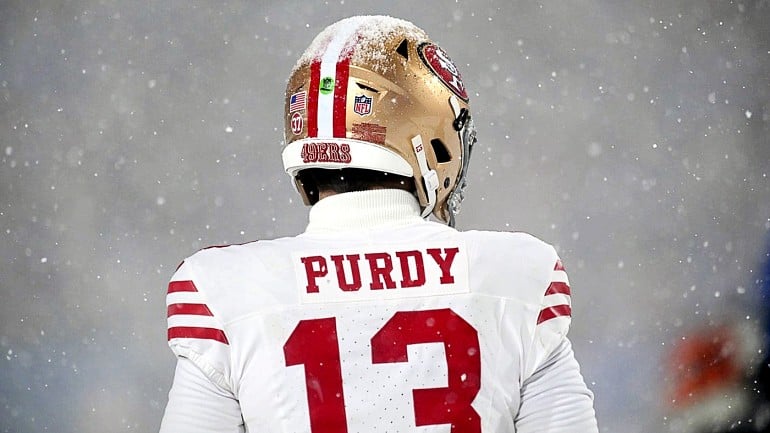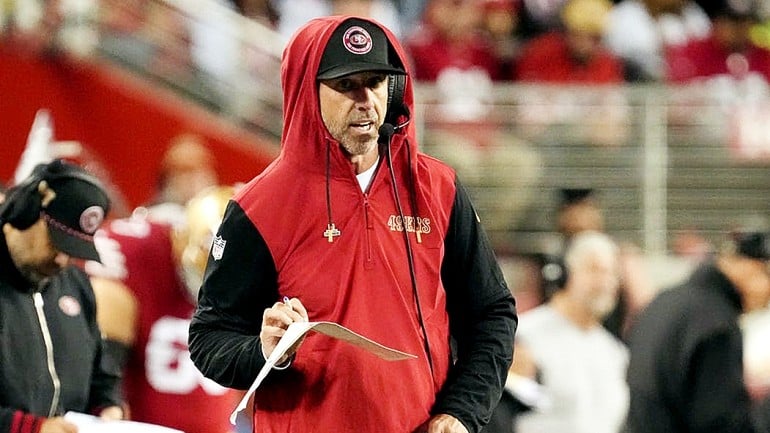I'm going to ask you to do something now. Some of you will think I'm asking you to indulge in pure fantasy. Others of you are already way ahead of me.
Assume, if you will, the bulk of the "experts" are right, and we're about to endure yet another losing season. Let's say that at the end of September we're one-and-two. At the end of October we're two-and-four. And at the end of November we're three-and-eight. Give or take.
Assume also, if you will, the offense is dreadful. As promised, the running game is solid, but it's weakened by the lack of a field-stretching passing game. Due to various factors—say, conservative playcalling, woeful pass-protection, and a disappointing receiving corps, among others—the passing game just never gets untracked.
And assume finally, if you will, the book on Shaun Hill is quickly closed. Taking advantage of the relative immobility of his feet and the relative weakness of his arm, defenses mercilessly beat him up and shut him down. At some point in these months, Mike Singletary turns to Alex Smith, who finishes his star-crossed 49ers career essentially as he started it, running for his life while looking in vain for someone to throw to, the last shreds of his confidence successfully obliterated.
Going into December, Singletary has a team going nowhere, and he starts looking ahead to next year, hoping, of course, he'll be around to see it, no guarantee when he's failed to deliver on the promise his boss had made the year before.
And he looks up and down his bench, and his eyes come to rest. On Nate Davis.
Davis, a rookie quietly selected in the draft's fifth round, hasn't played since the preseason. But what a preseason it was. In their much-ballyhooed but ultimately uninspiring competition, Hill completed 17 of 30 for 160 yards and a rating of 71.5, and Smith was 8 of 16 for 63, with a touchdown and a pick and a rating of 54.9. Davis, meanwhile, completed 29 of 49 for 314 yards, two touchdowns and a pick, and a respectable rating of 83.2.
But it wasn't just the numbers. There was something about this kid, something that set him apart not only from Hill and Smith but also from the Ken Dorseys and Cody Picketts and other preseason mirages of years past. Actually there were many things. First, of course, was that cannon of an arm. You can't fake that, and you can't coach it; you either have, or don't have, that rare ability to make every throw in the book, and Davis proved immediately that he has it. (Let's put it this way: YouTube offers no video of Dorsey or Pickett throwing a 70-yard bomb.) But he was also surprisingly polished in his mechanics. His accuracy, the "prettiness" of his ball, his footwork while dropping back, and his body control while scrambling or rolling out, these all suggested a rookie well ahead of the curve. Finally, he seemed to exhibit all those lauded intangibles: poise, cool, and guts. His delivery of two last-minute touchdowns on the road—during the second half in Dallas and the first in San Diego—showed some serious moxie.
Sure, he hit some rough spots. And yeah, he was playing in the preseason against the opposing seconds and thirds. But what's telling is how hard it is to imagine, that in those same conditions, Hill or Smith would've done any better.
And we weren't the only ones who noticed, either. Some suggested he might be "the steal of the draft," akin to Tom Brady, perhaps the most notorious late-rounder ever. (You might recall the 49ers themselves had no need for Brady, having drafted Giovanni Carmazzi three rounds earlier.) Others reminded that Davis was once projected to go as high as the second round, before his value was suppressed by a weird combination of things, such as a subpar end to his college career, a slow time in the 40, an unusual football grip, a learning disability, and perhaps even a coaching conspiracy.
Put simply, there's a lot of intrigue surrounding this guy. But now it's December, the team is out of it, and Singletary needs to decide what to do with him.
In recent years, it's been proven that a rookie quarterback—Matt Ryan, for example—can do just fine on a solid, well-balanced team. Put him behind an offensive line that'll protect him, pair him with receivers who'll make plays for him, and give him a defense that'll take the heat off him, and not surprisingly your rookie quarterback will look like a star. But take those things away, and again not surprisingly, your rookie quarterback—say, Alex Smith—will look like a bust. Keep him out there long enough, and he might get so rattled that he never recovers. Hence the conventional wisdom that until you can give him all those things that he needs, just keep your rookie quarterback safe on the bench.
Of course, like all bits of conventional wisdom, this one—that on bad teams, rookie quarterbacks should be treated like they're made of glass—doesn't always hold. Troy Aikman and Peyton Manning were thrown to the wolves, each endured a miserable season, and each seems to have recovered nicely. The Lions can only hope that Matthew Stafford follows suit. But we 49er fans have seen it at work, from both sides now. On the one hand, knowing his team was the NFL's worst, Bill Walsh went out of his way to protect Joe Montana, inserting him only to run a couple of well-practiced plays, usually near the opposing end-zone. Basically, Walsh put Montana into situations where it'd be easy for him to look good and build his confidence, and then Walsh got him the hell outta there. On the other hand, despite having a team that again was the NFL's worst, Mike Nolan sent Alex Smith into action and said, in essence, "Good luck, son." And we're painfully aware of how that turned out.
If Singletary is tempted to play Nate Davis, it'll be because we're a bad team. So with Smith's tragedy staring him straight in the face, Singletary might think it best to leave Davis on the bench, or to play him in only Montana-like spurts. But the problem is, we might not be able to afford to wait. Walsh had the luxury of knowing Montana was his guy. We don't yet have the same commitment to Davis, and the clock is ticking. If we don't find out about him now, and next year we're in position to draft Sam Bradford, Jevan Snead, or Colt McCoy, you can bet we're gonna take him. And that guy, not Davis, is the guy we're gonna commit to, by way of the usual first-round cash. Sure, Davis might end up starting anyway, but unless that first-round pick is yet another first-round bust, Davis won't be starting here.
So here's the dilemma. If Davis is gonna be the guy for us, he might need to show it, this year. But if our team is bad enough for Davis to play, he might not be able to show it, this year.
For all we know, Nate Davis is the one we've been waiting for. Wouldn't it be sad if we missed out on him, even though he was here all along?



